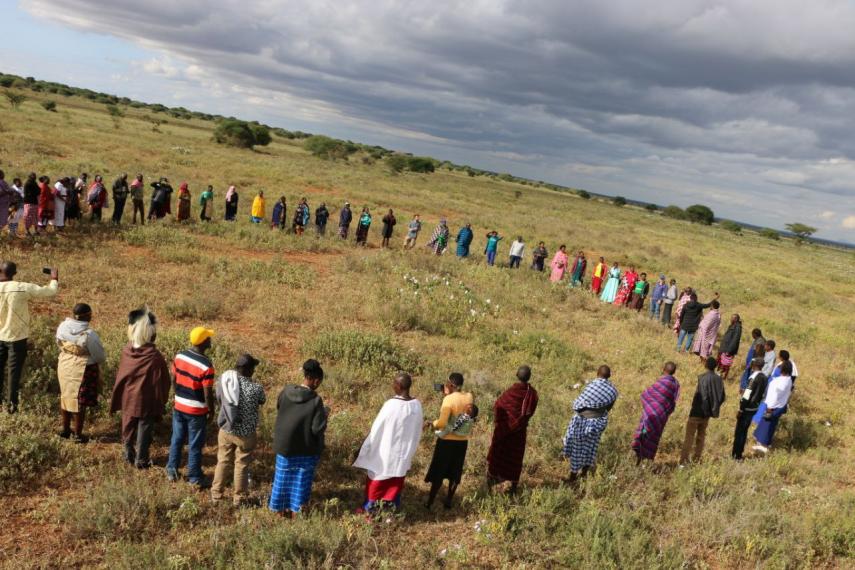July 2022
Kigali, Rwanda
On the opening day of the Africa Protected Areas Congress (APAC) in Kigali, Indigenous Peoples from East Africa call on the IUCN to put their rights front and center in any conservation efforts being proposed, including an immediate end to illegal evictions from areas where people have lived in harmony with nature for thousands of years.
“It’s the indigenous communities who have been taking care of our lands,” said a Maasai community representative from Tanzania.
“This is why our lands are so attractive for the ‘conservationists’ to come and evict us. They say we are destroying our land. If we have done that then why is our land attracting them?” she said.
Too often, efforts at conservation have come at huge cost to the peoples who have lived in the designated areas for millennia, and as a result, at a huge cost to the ecosystems and wildlife they’re expecting to protect. This is the case, for example, for thousands of Maasai who have been displaced, including those targeted in direct and brutal evictions last month in Loliondo, Tanzania, to make space for tourism and wildlife hunting. Most of the evicted Maasai are lacking basic needs, including food supplies, medical care and accommodation, and over 2,000 have now crossed into Kenya to avoid further harassment and detention by security forces. Judicial harrassment followed the shootings, with a case of the 27 people (including 9 ward councillors) charged with murder set for the 28 of July while the 72 Loliondo residents that were arrested for allegedly being “illegal” immigrants have been released on bail except for one person.
“The colonial governments gazetted our lands and trampled on our traditional ways of conservation”
– a Sengwer female community representative from Kenya.
“Our independent governments inherited the colonial ways of conservation and gazetted more of our remaining lands without consulting us,” she said.
“They said they were evicting us so they could enable conservation, while in reality it is a way to get money from donors.”
In the leadup to APAC, last month ten indigenous peoples’ communities from Uganda, Kenya and Tanzania came together for the ‘East Africa Assembly on Land, Justice and Indigenous Peoples’ Co-operation’, the first round of a series of community-led assemblies to explore concrete ways to address the legacy of colonial conservation in Africa and put an end to indigenous land appropriation.
In the declaration prepared from the assemblies, the communities laid down a series of demands, including:
‘…[we] call on IUCN – including its state and non-state members – to set up a commission that is sufficiently resourced, staffed, empowered, and given an urgent timeline, to tackle the legacy of the colonial approach to conservation in Africa. This approach is based on appropriating community lands rather than recognising them as the rightful owners and custodians of their lands.’
‘Such appropriation is through forceful evictions, long-term impoverishment, and constant attacks on people’s basic rights, including freedom of expression and freedom of assembly. Such a commission* needs to attend to both these national situations and to the international organizations and governments who legitimize such practices.’
During one of the assemblies an Ogiek elder from Mt. Elgon spoke of how indigenous peoples’ ways of life are focused on caring for their environment.
“‘Conservation’ is a foreign idea altogether. It has no meaning to us. We live by our environment, and our environment – our forests and animals, live by us.” he said.
During the two assemblies participants shared the story of their struggle against land dispossession highlighting the importance of building solidarity and collaboration among communities facing colonial conservation. The three-day community-organized assemblies focused on:
1) women’s role in the land struggle and in sustaining community culture and livelihoods;
2) successes and challenges in the struggle for land rights, and;
3) caring for the land through community control and indigenous knowledge.
At the end of the assemblies communities drafted the People-to-People Declaration at Laboot – a declaration articulating communities’ demands to IUCN, including the establishment of an indigenous peoples-led commission on “decolonising conservation ” to promote and oversee the transformation of the legal and policy framework regulating land management and tenure in all IUCN member states.
In the declaration participants included a collective statement speaking out against the ongoing evictions of Maasai residents from Loliondo, Tanzania. The People-to-People Declaration at Laboot was presented at the APAC pre-congress meeting in Kigali on July 16-17 by assembly participants from Uganda and Kenya – it also helped shape the IPLCs statement at the APAC opening session and the pre-APAC Nairobi Declaration of IPLCs.
Milka Chepkorir speaking at the APAC opening session on Monday, 18 July in Kigali, Rwanda.
“We know our world is facing a crisis – we are losing biodiversity at a frightening rate and the climate is changing, making our planet unliveable for us all.”
– Milka Chepkorir during the IPLC statement at the APAC opening session. Watch her speech here.
“Unfortunately, the conservation response, adopted from colonial times, has been sustained and even refined with increased militarization. These approaches have not only failed to offer a real solution to this crisis, but they have also caused untold harm and trauma to the very citizens which governments should look to as conservators. To say this is only in the past will be a lie. As you are listening to me, it is happening to my brothers and sisters,” said Chepkorir.
“Our trauma, our rights, and our wish to be Africa’s primary natural resource conservators should not be, once again, swept under the rug.”

